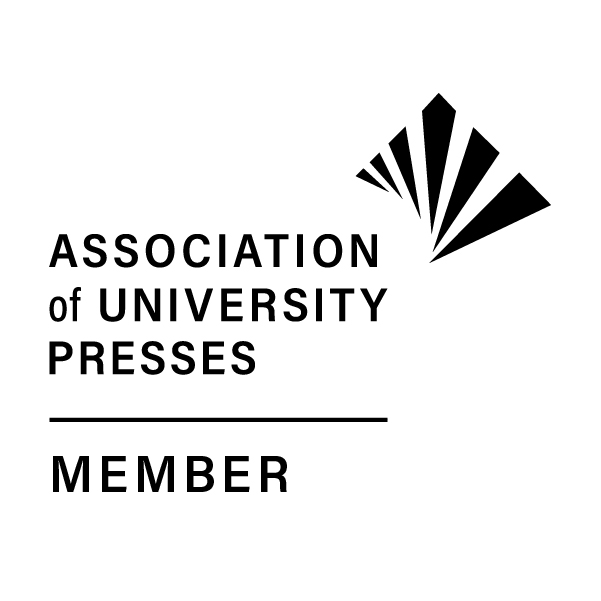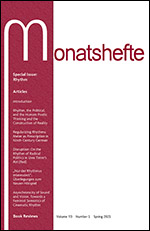|


|

Subscribe
Read the Journal Online
Submission Guidelines
Editorial Board
Receive Email Updates
Advertise in Monatshefte
Indexes/Abstracts
Current Issue TOC
Back Issues TOC
Monatshefte 2022 Subscription Rates
Institutions:
print & online $271
online only $233
Individuals:
print & online $103
online only $86
Non U.S. Postage (no postage charges for online-only subscriptions)
Airmail: add $40/yr.
Canadian Subscribers: add 5% GST. |
Monatshefte
Volume 99, Number 4, Winter 2007 Table of Contents
Articles
Emily S. Hauze
Who Can Write an Opera? F.C. Bressand and the Baroque Opera Libretto
Abstract:
The German opera librettist of the seventeenth century wielded a surprising amount of power. The birth of opera in Germany is marked by authorial practices that seem peculiar by current standards, the interpretation of which is complicated by the disappearance of virtually all opera scores from this period. The libretti, however, were consistently preserved and published—as operas or singspiels—under the name of the librettist. The genre of texts written for operatic setting was a recognized literary form in itself. The German opera librettist stood in a tradition that reached back to the medieval Minnesingers and that was rearticulated in the poetics of Martin Opitz. Through the example of F. C. Bressand, a prominent Baroque librettist who has now nearly been forgotten, I argue that the authorial dynamic between opera composers and librettists was the reverse of that which has since prevailed: the librettist was considered the primary author. (ESH)
Astrida Orle Tantillo
Damned to Heaven: The Tragedy of Faust Revisited
Abstract:
By reading Faust through the lens of Goethe’s own scientific principles, a new reading of the whole arises, a reading that revisits the historical debates about the conclusion of the play, whether about its morality, happy ending, or portrayal of technology. According to the naturalistic ethic that emerges within the text, the ending is tragic in that Faust ascends into a sphere characterized by stasis and non-productivity. The play thus is modern in its rejection of religious morality, while anti-modern in its critique of the scientist hero. (AOT)
Matthias Uecker
The Face of the Weimar Republic. Photography, Physiognomy, and Propaganda in Weimar Germany
Abstract:
The Weimar years were characterised by an immense rise in photographic publications, accompanied by a discourse that ascribed authenticity and reliability to the medium and saw it as superior to language. The article analyses photographic books by August Sander, Ernst Jünger and Kurt Tucholsky focusing on the communication strategies in which photographic images were embedded. It shows that the photographic series, its combination with text and reliance on physiognomic knowledge created an arrangement in which the visible details of individual images were displaced or functionalised in favour of a pre-existing ideological knowledge which images were merely capable of illustrating. (MU)
Rainer Godel
Phasenweise Zuwendung. Stadtideale in Brigitte Reimanns Roman Franziska Linkerhand
Abstract:
By examining the plot and the narrative structure of Brigitte Reimann’s novel Franziska Linkerhand, the article demonstrates that this novel cannot be sufficiently described by categorizing it within the dichotomies of ideology versus resistance or of affirmative versus critical positions. The analysis does not focus on the theme or the motif of the city, nor on architecture or architectural theory represented in the novel, but on the narrative perception and evaluation of the city. It is this aspect that had, on the one hand, produced new literary forms in the city novels as early as the 1920s. On the other hand, it had been subject to the standardizing thrust of ideologies aiming at a collective norm of visual perception of the city. The article shows how the narrative structure of the novel undermines the ideological versions of architectural design with which Franziska, the protagonist, is confronted. The novel does not depict an ideological or an individual solution that would manage to combine the unsettled individual emotion with the differing and varying ideals of the city. The form of the literary text and the narrative structure run counter to the ideological norm without completely and openly refuting it. Ultimately, Reimann’s novel is an instance of literature demonstrating the limits of ideological sway. (RG; in German)
Personalia
Introduction, German Departments in the U.S.A., German Departments in Canada, Promotions, New Appointments, Visitors, Retirements, Necrology, Doctoral Dissertations, Summary
Book Reviews
Arons, Wndy, Performance and Feminity in Eighteenth-Century German Women’s Writing: The Impossible Act (Gail Hart)
Beßlich, Barbara, Der deutsche Napoleon-Mythos. Literatur und Erinnerung 1800 bis 1945 (Jost Hermand)
Dönike, Martin, Pathos, Ausdruck und Bewegung. Zur Ästhetik des Weimarer Klassizismus 1796–1806 (Peter J. Schwartz)
Dotzler, Bernhard J. und Sigrid Weigel, Hrsg., “fülle der combination”. Literaturforschung und Wissenschaftsgeschichte (Heather I. Sullivan)
Dubiel, Jochen, Dialektik der postkolonialen Hybridität. Die intrakulturelle Überwindung des kolonialen Blicks in der Literatur (Birgit Tautz)
Eigen, Sara and Mark Larrimore, eds., The German Invention of Race (Carl Niekerk)
Elsaghe, Yahya, Thomas Mann und die kleinen Unterschiede. Zur erzählerischen Imagination des Anderen (Hans Rudolf Vaget)
Fuchs, Anne, Mary Cosgrove, and Georg Grote, eds., German Memory Contests: The Quest for Identity in Literature, Film, and Discourse since 1990 (Joseph W. Moser)
Garloff, Katja, Words from Abroad: Trauma and Displacement in Postwar German Jewish Writers (Rochelle Tobias)
Haas, Birgit, Hrsg., Macht. Performativität, Performanz und Polittheater seit 1990 (Dagmar Jaeger)
Heine, Gert und Paul Schommer, Thomas Mann Chronik (Hans Rudolf Vaget)
Herzog, Dagmar, Sex after Fascism: Memory and Morality in Twentieth-Century Germany (Frederick A. Lubich)
Kinderman, William and Katherine R. Syer, eds., A Companion to Wagner’s Parsifal (Anthony J. Steinhoff)
Kohl, Katrin and Ritchie Robertson, eds., A History of Austrian Literature: 1918–2000 (Katherine Arens)
Košenina, Alexander, Karl Philipp Moritz. Literarische Experimente auf dem Weg zum psychologischen Roman (Markus Wilczek)
Mahoney, Dennis F., ed., The Literature of German Romanticism (Karen Campbell)
Matthias, Bettina, The Hotel as Setting in Early Twentieth-Century German and Austrian Literature: Checking in to Tell a Story (Felix Tweraser)
Mundt, Hannelore, Understanding Thomas Mann (Hans Rudolf Vaget)
Nolte, Andreas, “Ich bin krank wie ein Hund, arbeite wie ein Pferd, und bin arm wie eine Kirchenmaus.” Heinrich Heines sprichwörtliche Sprache (Jeffrey L. Sammons)
Pankau, Johannes G., Sexualität und Modernität. Studien zum deutschen Drama des Fin de Siècle (Romana Weiershausen)
Polaschegg, Andrea, Der andere Orientalismus. Regeln deutsch-morgenländischer Imagination im 19. Jahrhundert (Kamakshi P. Murti)
Presner, Todd Samuel, Mobile Modernity: Germans, Jews, Trains (Dagmar C.G. Lorenz)
Schillemeit, Jost, Studien zur Goethezeit. Herausgegeben von Rosemarie Schillemeit (Ehrhard Bahr)
Shookman, Ellis, Thomas Mann’s Death in Venice: A Novella and Its Critics (Hans Rudolf Vaget)
Trabant, Jürgen, Europäisches Sprachdenken. Von Platon bis Wittgenstein (Wolfert von Rahden)
Index Volume 99 (2007)
|


